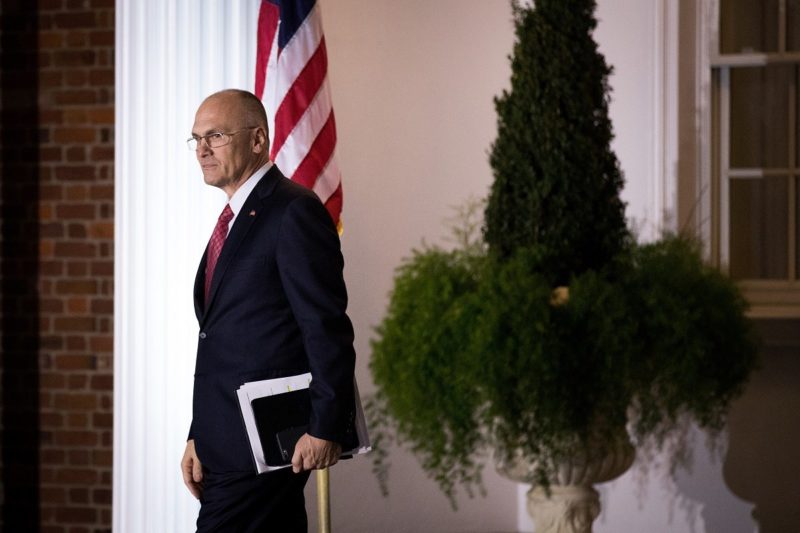Trump’s Choice for Labor Secretary Tried to Outlaw Abortion
Earlier in his life, Andrew Puzder was also well-known for his work as an anti-choice attorney. In the 1980s, he helped author a sweeping piece of anti-choice legislation in Missouri that included radical “personhood” language defining life as beginning at conception.

Fast-food executive Andrew Puzder, who once authored an extreme abortion restriction in Missouri, was selected by Republican President-elect Donald Trump to serve as secretary of the Department of Labor.
Trump announced that Puzder would be nominated in a Thursday statement that claimed the restaurant CEO had an “extensive record fighting for workers,” though it did not provide examples of how he did so. “Andy will fight to make American workers safer and more prosperous by enforcing fair occupational safety standards and ensuring workers receive the benefits they deserve,” the statement continued, adding that Puzder “will save small businesses from the crushing burdens of unnecessary regulations that are stunting job growth and suppressing wages.”
Puzder currently works as the chief executive of CKE Restaurants Holdings Inc., which includes fast-food franchises such as Carl’s Jr. and Hardee’s—burger chains that have come under fire for the “sexist” depictions of women in their advertisements.
He has vocally opposed implementing the Affordable Care Act, raising the minimum wage, expanding eligibility for overtime pay, and other efforts to help workers. In a March 2016 op-ed for the Wall Street Journal, Puzder stoked fears that offering a living wage and paid sick time to employees would drive up labor costs, forcing companies to switch to automation.
But earlier in his life, Puzder was also well-known for his work as an anti-choice attorney. In the 1980s, he helped author a sweeping piece of anti-choice legislation in Missouri that included radical “personhood” language defining life as beginning at conception. Measures of this nature would ban abortion and many forms of contraception. He discussed his role in writing the legislation in a 2009 interview with the St. Louis Business Journal.
Puzder crafted the law with the aim of effectively gutting Roe v. Wade. He told the Chicago Tribune in 1989 that the legislation was “not an abortion statute” but was instead designed to make the U.S. Supreme Court “face the question of deciding whether a state can decide when life exists.”
Provisions of that bill were eventually upheld by the U.S. Supreme Court in its 1989 decision in Webster v. Reproductive Health Services, which was the first Court case to challenge Roe since it was decided and gave states more authority to write their own laws on abortion.
Puzder also defended anti-choice protesters in St. Louis serving jail time for breaking a court order not to protest at abortion clinics.
After the Supreme Court’s decision on Webster, he served on then-Gov. John Ashcroft’s “Task Force for Mothers and Unborn Children,” a group of seven anti-choice advocates tasked to “come up with recommendations for new state restrictions on abortion,” according to a July 1989 article from the St. Louis Dispatch. He offered to resign amid allegations that he had abused his ex-wife, telling the outlet that he “wouldn’t want this to hurt the pro-life movement.” The New York Times noted in an article Thursday that the Trump transition team had given them a recent letter from Puzder’s ex-wife about the allegations of abuse that said she “withdrew those allegations.”
According to a Thursday press release from reproductive rights advocacy group NARAL Pro-Choice America, the position Puzder is slated to fill can play a key role in implementing—or rescinding—worker protections such as paid family leave, anti-discrimination efforts for pregnant employees and applicants, and accommodations for those breastfeeding.
“The Department of Labor can play a key role in developing, promoting, and enforcing policies that expand reproductive freedom and benefit women and families, or it could roll back the clock for working people and their reproductive rights,” the release explained.
The possibility of Puzder serving as secretary of labor was criticized by economic policy and labor organizations.
“The Secretary of Labor should serve as an advocate for working people, enforcing rules that protect workers and crafting new regulations to make sure everyone gets a fair shake on the job. He or she needs to be a voice for workers in the development of all administration policies,” said Lawrence Mishel, president of the Economic Policy Institute, in a Thursday press release responding to the news that Puzder would be Trump’s choice for the spot.
Mishel continued by saying that Trump had run on a platform claiming to help working people, but noted that “there is nothing in [Puzder’s] record or his public statements to indicate that he would lead in developing policies and enforcement strategies to generate higher wages and better quality jobs for America’s workers.”
Randi Weingarten, president of the American Federation of Teachers, a union consisting of 1.6 million people, said in a press release that Trump’s pick “puts the Department of Labor—which was created to help workers—squarely in the hands of the titans of corporate America.”
“While this comes as no surprise, it is deeply disappointing. After a long campaign of promising to return prosperity and good jobs to struggling families, this pick makes it clear that Trump won’t drain the swamp—he’ll fill it with worse and worse kinds of slime,” Weingarten said.

